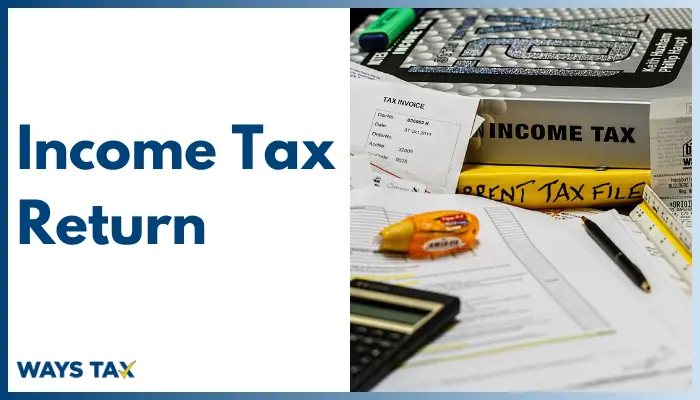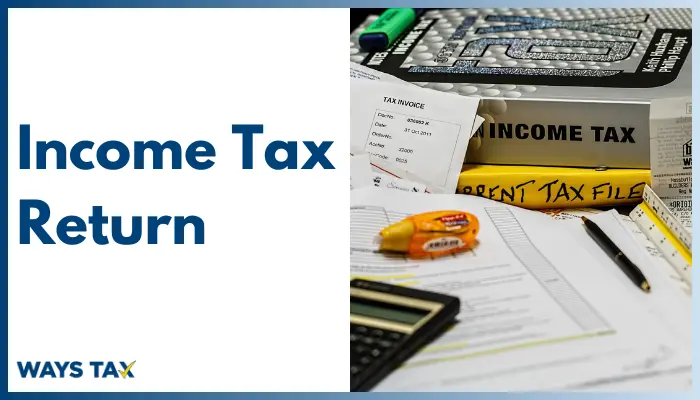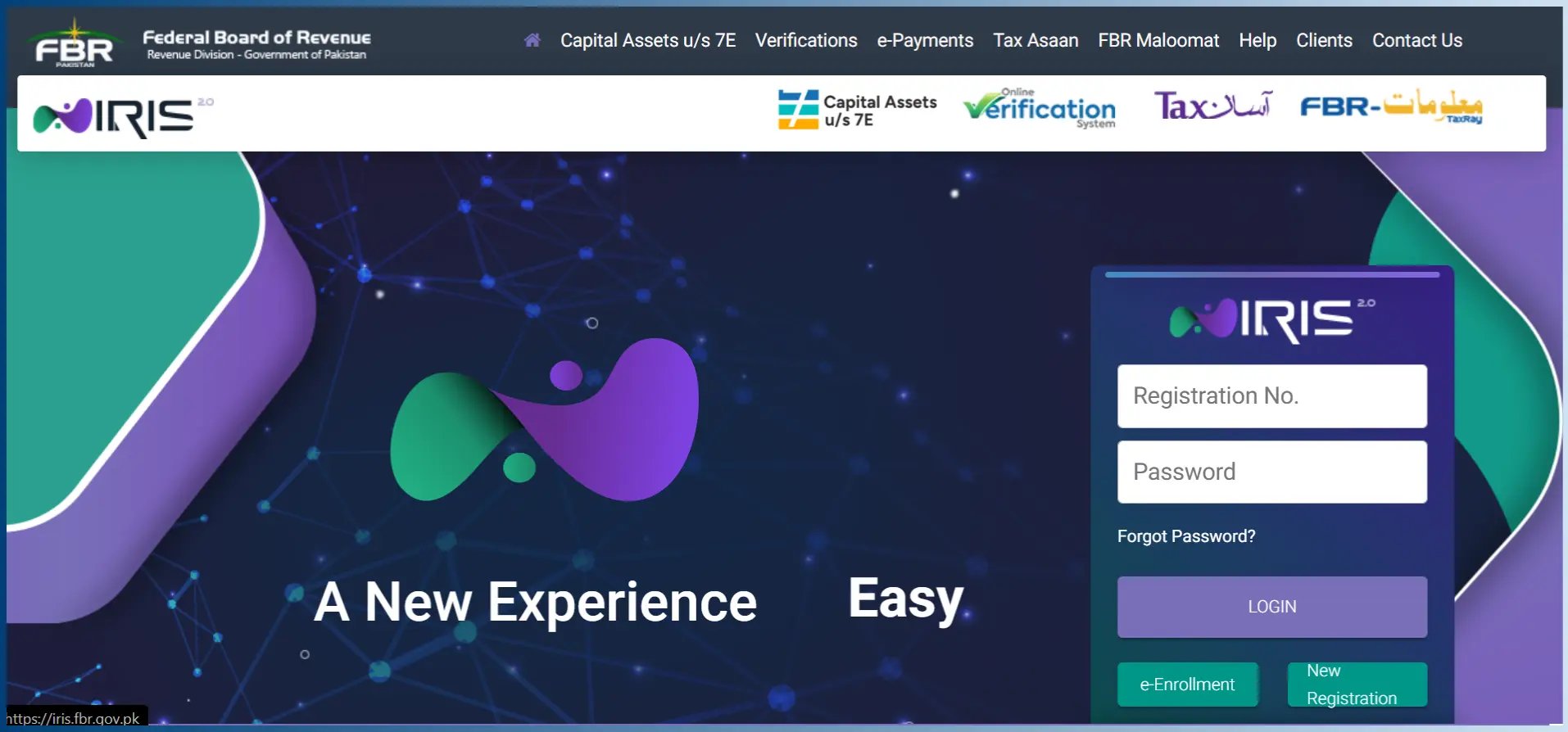
Income Tax Return Filing Service in Pakistan – Complete Online Guide
Income tax return filing may be a stressful undertaking for both individuals and businesses, especially given the number of taxpayers on the Active Taxpayer List (ATL) increasing each year.
Income tax return filing service by Waystax can ease your burden without any hassle.

What is an income tax return filing in Pakistan?
An income tax return is a formal declaration of income, expenses, and other tax-related information submitted to the tax authorities. It summarises your earnings, deductions, and tax liabilities for a given fiscal year. In most countries, submitting an income tax return is required for individuals and corporations earning more than a particular amount.
Why Do We File Income Tax Returns?
The following are the benefits of filing an income tax return:
1) Legal Compliance
Filing income tax returns guarantees that you meet all legal obligations and avoid penalties and fines.
2) Claim Tax Refunds
If you have had too much tax deducted from your income, you may be eligible for refunds.
3) Proof of Income
Filed returns serve as formal proof of income, which is required for loan approvals, visa applications, and financial planning.
4) Avoid Audits and Penalties
Timely and accurate return filing reduces the possibility of audits and further investigation by tax authorities.
5) Carry Forward Losses
You can use capital or business losses that you file returns for to reduce your future taxable income.
6) Eligibility for Government Tenders
Your income tax return serves as proof of tax compliance for many government contracts and tenders.
7) Easier Loan Approvals
Banks often request tax returns as part of the loan application process, making it easier to secure loans.
Who Should File Income Tax Return in Pakistan?
Individuals who earn more than 50% of their income from salaries and also from other sources are qualified to file income tax returns. Filing is required if their income is above the taxable threshold, although it is beneficial to file even if it is below the limit.
For individuals and organizations managing multiple returns, using a professional solution like Waystax can simplify the process.
Who is Not Required to File an Income Tax Return in Pakistan?
- Low-income individuals: Income below the tax-free threshold as per the latest schedule (salaried/business thresholds can vary by tax year).
- Dependent individuals: Housewives, students, unemployed persons with no taxable income.
- Non-resident Pakistanis (NRPs): Those with no Pakistan-source income/assets/business (case-to-case).
- Tax-exempt entities: Registered charities, non-profits, and certain institutions (subject to conditions).
- Agricultural income earners: Income solely from agriculture (handled separately in many cases).
Exception: You may still need to file if you own property, a high-value vehicle, or want ATL benefits.
Note: These rules can change by tax year. The safest approach is: if you want ATL benefits, proof of income, or you own major assets, filing is still recommended.
Income Tax Return Filing Deadline (Last Date + Late Filing)
The tax filing deadline depends on the tax year and taxpayer category. Deadlines can also be extended or changed through official notifications.
If you are filing late, it is still better to file as early as possible to reduce compliance issues.
Documents Required for Income Tax Return Filing
To register online for filing an income tax return, individuals may need the following documents and prerequisites.
Essential Requirements
- A computer, scanner, and internet connection
- A cell phone with a SIM registered under the individual’s CNIC
- A personal email address
Common Documents (Individuals)
- Salary slips / annual salary certificate (for salaried individuals)
- Bank statements showing income and expenses
- Investment records (if applicable)
- Rental income details (if applicable)
Business / Self-Employed (If Applicable)
- Business income and expense records
- Evidence of tenancy/ownership for business premises (if applicable)
- Utility bill for business premises, paid within the last 3 months (if applicable)
Scanned Documents (PDF format – if required during registration)
- Personal bank account certificate
- Supporting documents as requested by the system
How to File Income Tax Return Online in Pakistan (Step-by-Step on IRIS)
Filing your income tax return in Pakistan has become easier thanks to the digital system of the Federal Board of Revenue.
If you’re unsure how to get started, this guide will walk you through the entire process.

Step 1: Register Yourself with FBR
Before filing your tax return, you must register with the online system. Follow these steps:
- Visit the official FBR website.
- Under “Taxpayer Registration,” select “e-Enrollment for Registered Persons.”
- Fill out the required details, including your CNIC, contact information, and other personal details.
- Submit the form and wait for confirmation of your registration.
Step 2: Get Your National Tax Number (NTN)
The NTN (National Tax Number) is automatically assigned upon successful registration. This unique number is required for tax filing and related matters.
Step 3: Log in to the Iris Portal
- Go to the Iris portal.
- Enter your CNIC or NTN registration number along with your password.
- If logging in for the first time, follow the instructions to set up your password.
- After logging in, your dashboard will appear.
Step 4: Select Tax Year and Return Type
On the dashboard, select the correct tax year and choose the return that matches your category (salaried individual, business, etc.).
Selecting the correct option matters because it affects the sections you must fill.
Step 5: Complete the Tax Return Form
- Carefully enter your personal details, sources of income, tax deductions, and any eligible tax credits.
- The system will calculate tax based on the information you provide.
- Review all details thoroughly before proceeding.
Step 6: Submit Your Tax Return
- Double-check all entries for accuracy.
- Click the Submit button to file your return.
- You will receive an official acknowledgement receipt as proof of submission.
Step 7: Pay Any Due Taxes (If Applicable)
If you have any outstanding tax liability, ensure timely payment to avoid penalties. You can pay through:
- Online banking
- ATM or bank transfers
- E-payment options
Save the payment proof for the record.
Wealth Statement Reconciliation
Your wealth statement will only be successfully submitted if your income has surpassed or fallen short of your expenses. In another case, if your worth has risen or reduced by the same amount from the previous year. You will not be able to file your income tax return if you do not reconcile your wealth statement.
Common items people declare in wealth statement (if applicable):
- Property
- Vehicle
- Gold
- Cash/bank balances
- Investments (shares, savings, etc.)
- Gifts received
- Loans (given/taken)
Income Tax Return for a Salaried Individual (Form 114(I))
For a salaried individual to determine if they fall under the income tax slab, to effectively file their return, they must fill out the Declaration form 114(I). This form is available to those who solely get income from their salaries and other sources, where their salaries account for more than 50% of their total income.
Nil / Zero Income Tax Return in Pakistan
A nil/zero return is generally used when a person has no taxable income for the year. It is if you still want a proper record and (where relevant) filer/ATL benefits.
After Filing: Status Check, Download Return Copy, Print, Filer Status
How to Check Income Tax Return Status
- Log in to IRIS
- Open your submitted forms/returns
- Select the relevant tax year and view status
How to Download Income Tax Return Copy Online
After submission, you should download and keep:
- Return copy (PDF)
- Acknowledgement receipt
- Any payment proof (if paid)
How to Print Income Tax Return from IRIS
- Download the return PDF
- Print it from your computer/phone
- (We also share printable copies with clients.)
How to Check Filer Status (ATL)
You can check the filer status through the ATL search using CNIC/NTN.
How to Revise / Edit Income Tax Return After Submit
A revised return is usually required if you submitted something incorrectly, such as:
- Wrong tax year selected
- Missing advance/withholding tax
- Wrong income head (salary vs business)
- Wealth statement mismatch
- Missing bank balances/assets
Revision process (simple):
- Open the relevant return → correct details → submit revised return → download updated acknowledgement.
Taxpayer Registration Basics (Modification / Update / Cancellation)
Taxpayer Registration Basics
- Who can register: Individuals, companies, AOP, and foreign nationals can e-enrol.
- E-enrollment: Gives NTN/Registration Number and access credentials.
- NTN for individuals: CNIC is used as the NTN/registration number.
- NTN for AOP/companies: A separate NTN is issued.
- IRIS portal: Used for income tax filing.
Modification of Income Tax Registration
- Registration can be updated if any information is changed or missing.
- File the modification form through IRIS.
- The Commissioner may review and inquire before approval/denial.
- If denied, representation can be filed within 30 days (process-based).
Cancellation of Income Tax Registration
- The Commissioner can cancel through a written order.
- Cancellation generally requires no outstanding liability and proper verification.
Change in Particulars of Registration
If there is any change in name, address, or particulars, the taxpayer should inform the relevant office/portal within the prescribed time.
Income Tax Return Filing FAQs
Simplify Income Tax Return Filing with Ways Tax
It doesn’t have to be a difficult effort to file income tax returns. We at Ways Tax are committed to making the process easier with our income tax return filing service.
Our knowledgeable staff is here to offer complete support, guaranteeing the timely and accurate filing of income tax returns.
You can easily handle the complexities of tax filing with our expert assistance and steer clear of any pitfalls. Concentrate on the things that are most important to you, and hire us for online tax filing!
